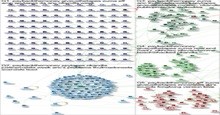If you want to grow, go for the marketing swingers, not the followers
All election campaign managers know the importance of targeting the swing voters. The theory is that in any campaign, there's a group of voters who will support one political party or another no matter what, so you shouldn't waste time on them, other than trying to encourage the voters to turn out - there really isn't much point. It's where the swing voters swing to that actually makes a difference.
Think about it. Many diehard ANC supporters would never consider voting for the DA, and vice versa. In fact, when we map political discussions, we see very clear and distinct party groupings, even when they are talking about the same issues. DA supporters speak to DA supporters and ANC supporters speak to ANC supporters. The interesting thing is that EFF supporters may not be as tightly held, and they manage to engage in conversations across the spectrum. EFF supporters actually do speak to ANC supporters and DA supporters. Strategically, the EFF needs to recognise this, as they may be holding mostly swing voters whose support could evaporate quickly.
That's not very different to brand advertising and marketing, is it?
The importance of the swing vote in brand advertising and marketing
How much effort should we place on them, seeing as consumers will buy anyway? We merely need to remind them to buy. Although they may be loyal, they are not necessarily knowledgeable. They no longer need to do research as they're happy and no longer searching. This type of brand loyalist would have done some searching when first making the decision to invest in the category. Often after that, the purchasing decision is made without much thought and they continue to buy your brand, whatever happens.
Only a few of them with be raving fans, but many may not be great advocates because they don't have the tools to convince others.
Marketers who use social media to build their followers and their fan base may have missed this point. It's easy to get ROI by only targeting those who would buy your product anyway. It's a retention strategy, not a growth strategy.
Where social network analysis 2.0 comes in...
The question is, how do we find the swing voters/buyers and how do we influence them?
They are still on social media, but instead of being interested about how they group around the brand, we need to be interested in how they are grouped around the category. The community they belong to is interested in the product/service, and there may be brand awareness.
This is where social network analysis 2.0 takes us forward from ORM. More than sentiment, we need to understand who is talking about us and about our stuff, but we need a little more to go on than just the fact that they are doing so. We need to understand the dynamics that exist in that community, we need to understand the roles the different players have and how influential they actually are.
We need to do so based on the following aspects:
- What is the coordinating element of the conversation in the category? I call this the social object. Think of it as the campfire around which the conversation happens.
- We need to know the groupings in the community because a social media community is not an audience. It consists of different sub groups who group around ideas and people in the community.
- We need to know the key players in those groups and the roles they play.
- We need to identify the people in those roles and they type of influence they wield.
- We need to understand what they are talking about, the issues in the overall group and each subgroup.
- We need to be constantly watching what's going on, how the dynamics are changing.
- We need to know when a key event occurs in the community. Then we take our own role in the conversation - we become the facilitator of the conversation, we start the conversations and we empower the influencers to influence.
If we do that, we'll be focusing our social media efforts on the market, not just on our loyal groupies.
To grow we need to focus on the swingers, and to do that we need to know who they are and what they care about.
About Walter Pike
View my profile and articles...
